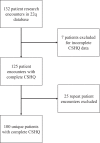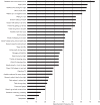Sleep profiles in children with 22q deletion syndrome: a study of 100 consecutive children seen in a multidisciplinary clinic
- PMID: 35975550
- PMCID: PMC9806771
- DOI: 10.5664/jcsm.10238
Sleep profiles in children with 22q deletion syndrome: a study of 100 consecutive children seen in a multidisciplinary clinic
Abstract
Study objectives: While previous studies have suggested a high prevalence of sleep disorders in children with 22q deletion syndrome (22qDS), they were limited by potential selection bias. In the current investigation, we assessed sleep characteristics in 100 consecutive children presenting to a 22qDS multidisciplinary clinic.
Methods: An observational retrospective case series of consecutive children presenting to 22qDS multidisciplinary clinic was performed. Children aged 2 to 17 years of age were included, and data were abstracted including sleep characteristics (sleep history, Childhood Sleep Habits Questionnaire [CSHQ], and free response questions), comorbid medical conditions, and demographics.
Results: Overall, 100 children were included in analysis, 85% of whom had scores on the CSHQ consistent with clinically meaningful sleep disorder. Sleep problems were common in all domains of the CSHQ, including daytime sleepiness (66%), sleep-onset delay (54%), parasomnias (52%), night wakings (52%), sleep-disordered breathing (49%), sleep duration (45%), bedtime resistance (38%), and sleep anxiety (33%). Overall CSHQ score was significantly associated with daytime behavioral problems and speech delay [F(2,97) = 10.4, P < .001, adjusted R2 = 0.16]. The most common interventions reported to be helpful for sleep by parents were behavioral (routine, bedtime story), environmental (light avoidance at night, calming music), and pharmacologic (melatonin, clonidine).
Conclusions: These data confirm a high prevalence of sleep disorders in a large, unselected sample of children with 22qDS, and suggest an important relationship between sleep dysfunction and daytime behavioral challenges. Our findings highlight the potential role for multimodal treatment approaches including behavioral, environmental, and pharmacologic interventions.
Citation: Ingram DG, Raje N, Arganbright JM. Sleep profiles in children with 22q deletion syndrome: a study of 100 consecutive children seen in a multidisciplinary clinic. J Clin Sleep Med. 2023;19(1):27-34.
Keywords: 22q deletion syndrome; childhood sleep problems; insomnia; pediatric.
© 2023 American Academy of Sleep Medicine.
Conflict of interest statement
All authors approved the final manuscript as submitted and agree to be accountable for all aspects of the work. The authors report no conflicts of interest.
Figures
Similar articles
-
Sleep and daytime behavior in children with obstructive sleep apnea and behavioral sleep disorders.Pediatrics. 1998 Nov;102(5):1178-84. doi: 10.1542/peds.102.5.1178. Pediatrics. 1998. PMID: 9794951
-
Sleep problems and daytime sleepiness in children with ADHD: Associations with social, emotional, and behavioral functioning at school, a cross-sectional study.Behav Sleep Med. 2019 Jul-Aug;17(4):411-422. doi: 10.1080/15402002.2017.1376207. Epub 2017 Oct 13. Behav Sleep Med. 2019. PMID: 28922019
-
Sleep and its relationship to pain, dysfunction, and disease activity in juvenile idiopathic arthritis.Clin Rheumatol. 2014;33(10):1425-31. doi: 10.1007/s10067-013-2409-x. Epub 2013 Oct 19. Clin Rheumatol. 2014. PMID: 24135889
-
Sleep in children with neoplasms of the central nervous system: case review of 14 children.Pediatrics. 2003 Jul;112(1 Pt 1):e46-54. doi: 10.1542/peds.112.1.e46. Pediatrics. 2003. PMID: 12837905 Review.
-
[Sleep disorders in patients with a neurocognitive disorder].Encephale. 2022 Jun;48(3):325-334. doi: 10.1016/j.encep.2021.08.014. Epub 2021 Dec 14. Encephale. 2022. PMID: 34916075 Review. French.
Cited by
-
Sleep in 22q11.2 Deletion Syndrome: Current Findings, Challenges, and Future Directions.Curr Psychiatry Rep. 2023 Oct;25(10):479-491. doi: 10.1007/s11920-023-01444-6. Epub 2023 Sep 18. Curr Psychiatry Rep. 2023. PMID: 37721640 Free PMC article. Review.
-
Investigating the relationship between sleep disturbances and psychopathology In children and adolescents with microdeletion of 22q11 chromosome: an exploratory study.Front Psychiatry. 2025 Jul 23;16:1595492. doi: 10.3389/fpsyt.2025.1595492. eCollection 2025. Front Psychiatry. 2025. PMID: 40771649 Free PMC article.
References
-
- Leader G , Murray M , O’Súilleabháin PS , et al . Relationship between parent-reported gastrointestinal symptoms, sleep problems, autism spectrum disorder symptoms, and behavior problems in children and adolescents with 22q11.2 deletion syndrome . Res Dev Disabil. 2020. ; 104 : 103698 . - PubMed
-
- Owens JA , Spirito A , McGuinn M . The Children’s Sleep Habits Questionnaire (CSHQ): psychometric properties of a survey instrument for school-aged children . Sleep. 2000. ; 23 ( 8 ): 1043 – 1051 . - PubMed
-
- Liu X , Liu L , Owens JA , Kaplan DL . Sleep patterns and sleep problems among schoolchildren in the United States and China . Pediatrics. 2005. 115 ( Suppl 1) : 241 – 249 . - PubMed
Publication types
MeSH terms
LinkOut - more resources
Full Text Sources
Medical
Miscellaneous



